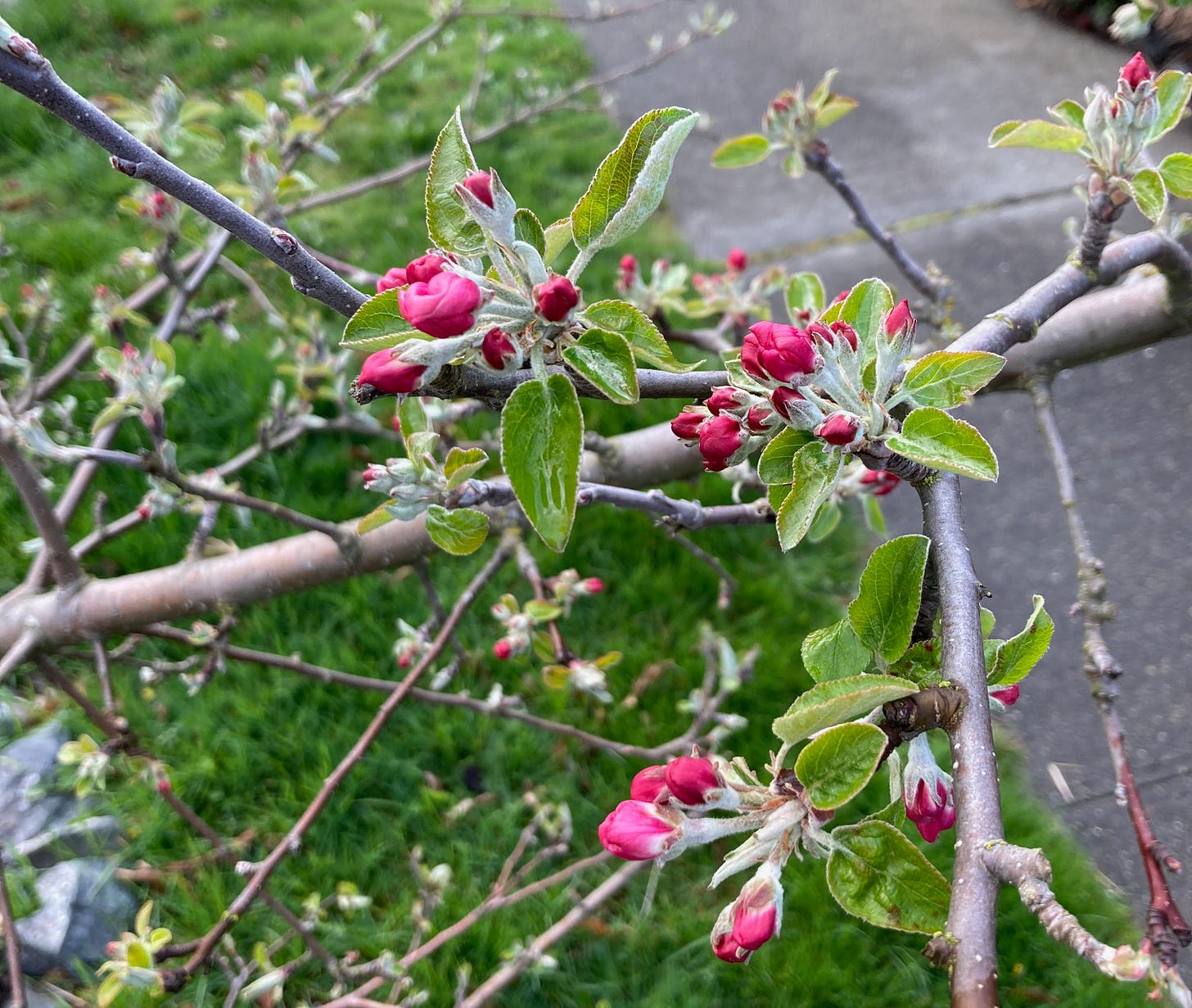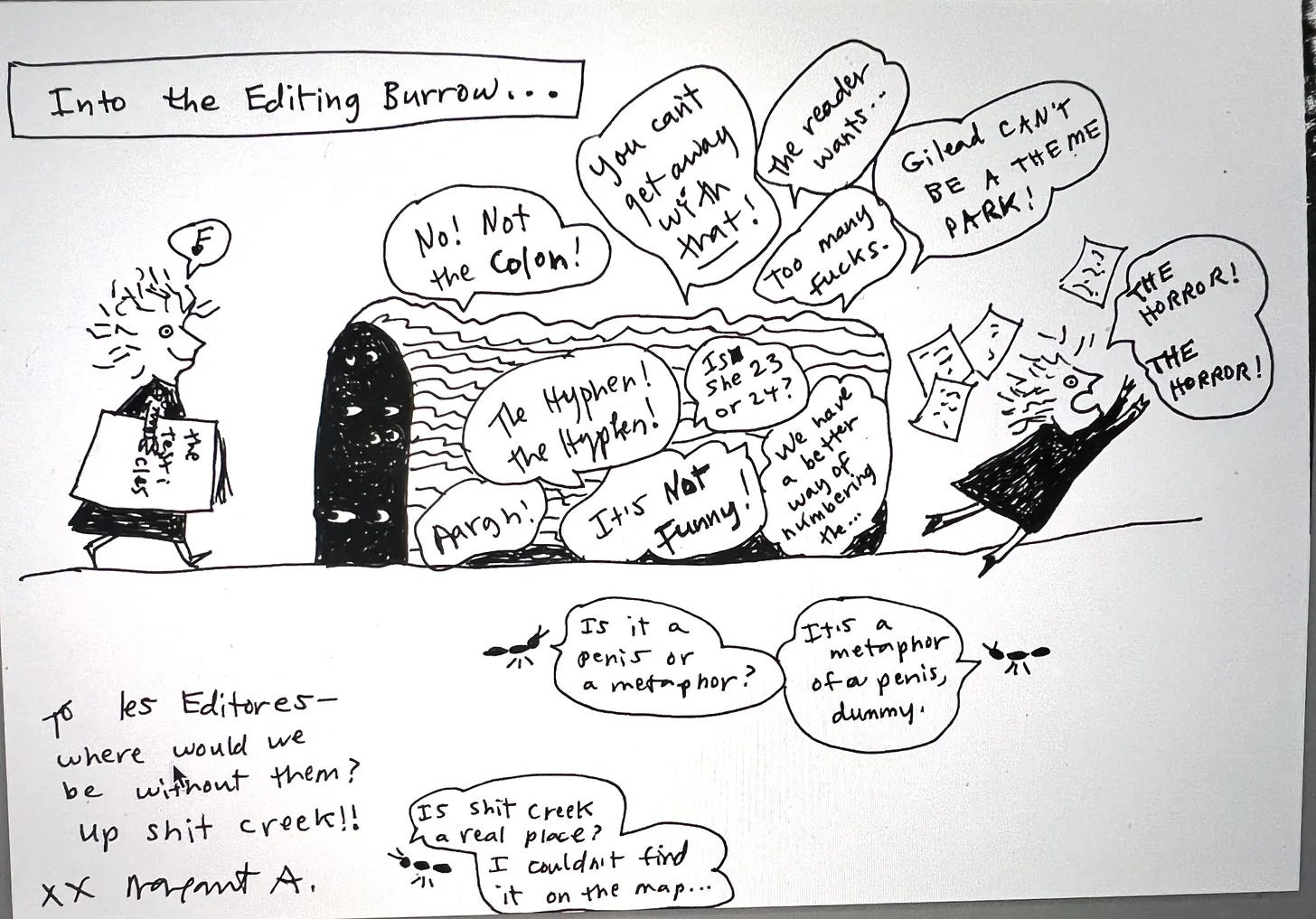May Newsletter
What's blooming in your garden? (This may be a metaphor.)
I spent Saturday afternoon weeding my garden. I love those spring days that feel like a preview of summer: kids running through the sprinklers, neighbors chatting on the sidewalk, that sun-kissed warmth on the back of my neck. I love weeding too. Research suggests that time spent in the garden is good for mental health. Getting my hands dirty, cleaning up flower beds and garden boxes, clearing the slate for the blooms and bounty to come — these tasks never fail to invigorate me, a boost that translates to my work and creative life. I am starting this month of May on happy footing, ready to tackle my never-dwindling list of to-dos with renewed enthusiasm, poised for whatever might bloom on the inside too.
How about you? What are you working on these days? What are you looking forward to seeing in bloom — metaphorically or not?
If you have a project that will need an editor’s eye soon, please consider my services. I’m currently filling openings in August and beyond. I edit book manuscripts in fiction and nonfiction, as well as smaller projects including articles, essays, website content, and more. My roster has been filled with interesting projects so far this year, ranging from a speculative thriller to a young adult epic fantasy, from website content for a natural home and skincare company to outreach materials for the Coalition for Grain Fiber. I enjoy this variety and the wonderful creators whose writing I get to help shine. I’d love to work with you!
An Editor’s Tip
Whether you write fiction or nonfiction, choosing the right point of view is essential to the success of your story. POV is often described as the “lens” through which you tell the narrative, and thus how the reader will perceive it. POV is tightly connected to narrative distance and voice: who holds the lens, how far do they hold it from the subject matter, and how clear or blurry is it?

In nonfiction — in which I include web or marketing content — considering POV means determining what voice you’ll use to communicate to your reader or customer. Do you write in the first person, sharing your story in the “I” voice, inviting your reader into chummy details? Do you loop them into a collaborative vision by using the “we” voice and flying high above the content? Do you empower them by using “you” and providing a sensory experience?
In fiction, do you use a single POV, specific to one character’s world view? And if so, do you zoom in really close, sharing everything that character notices, or do you limit their field of vision, to convey some mystery or suspense? A single POV can be in the first person (“I”) or in the third person (“he/she/they”) and the choice of voice can affect your story’s tone and the intimacy your reader may feel toward the protagonist or other characters. You might also alternate limited POVs, for example writing scenes or chapters that rotate a few characters’ single viewpoint. Another option is to zoom out and use an omniscient POV — where the reader is privy to a god-like view of the story, dipping down momentarily into different characters’ experiences. (Note: while memoir is nonfiction, it’s most often written in a close first-person POV.)
POV is one of the most frequent big-picture issues I encounter in developmental editing. POV options are varied, and it can be hard to pinpoint the right one and easy to mix them up (often called “head hopping”). If you feel unsure, I recommend trying different POV tactics, rewriting key scenes or arguments through different lenses. See what feels right, what sticks. The right point of view is a strategic tool that will enhance your story. No matter what POV you choose: be consistent throughout.
A Question for You
Is there an editorial topic you’d like me to address in this newsletter? It can be related to grammar or style, to plot or structure — or anything in between. Please let me know by replying to this email, and I’ll write my response in an upcoming newsletter.
News
Join me for Lunch Edits on May 3, at 12pm PST. On the first Wednesday of the month, I host this free midday Zoom call where we discuss all things writing- and editing-related. You can ask questions or simply share what you’re working on and commune with other writers. This is a collegial, casual gathering. Anyone is welcome. You can find the Zoom link here.
I’m excited to be a featured reader at Creative Colloquy’s Literary Reading and Open Mic on Monday, May 15, at Anthem Coffee in the Stadium District in Tacoma, Washington, from 7 to 9pm. Come grab a beverage and enjoy a diverse line-up of performers. Creative Colloquy recently celebrated their 9th anniversary. Stay tuned for the publication of the latest annual anthology, currently in production.
One of my essays will be included in Labor of Love: A Literary Mama Anthology, edited by Amanda K Jaros and forthcoming from Small Harbor Publishing later this year. The book will feature pieces written by former and current Literary Mama staff and contributors, on the theme of motherhood.
Our Tacoma community was rocked by the devastating news that artist and author Chandler O’Leary passed away suddenly from severe pneumonia last month. A tragic loss of a talented illustrator and lovely soul. If you’d like to support her family, please consider contributing to their GoFundMe.
Literary Links
Here are a few articles and newsletters that I enjoyed reading over the last few weeks. I hope you do too.
The Editorial Process — Margaret Atwood, Substack
Punctuation in literature of major languages is intriguingly mathematical — Phys.org
How to Pitch a Literary Agent — Lit Hub
My Marriage Was Never the Same After That — Maggie Smith, The Cut
Imagining a Harry Potter Rewrite — Gabrielle Blair, Substack
What it feels like to get divorced—and possibly remarried—at TED 2023 — Amanda Palmer, Substack
Recent Reads
The Leaving Season by Kelly McMasters — I adored this memoir about marriage, divorce, and motherhood. In seamlessly juxtaposed essays and stunning writing, McMasters explores love and grief, art and ambition, violence and agency against the backdrop of changing landscapes. I found it gripping. (Releases May 9.)
Tomorrow and Tomorrow and Tomorrow by Gabrielle Zevin — Have you read this New York Times Bestseller yet? Two oddball childhood friends reconnect in college and go on to launch a video-game company, an endeavor through which they grow apart and come together again. Gaming provides both context and metaphor for this poignant novel about friendship, love, and growth.
The Enigma of Room 622 by Joël Dicker — For a mystery, this novel felt oddly melodramatic and the writing often two-dimensional, almost like a soap opera, but it’s an entertaining romp through moneyed Switzerland, filled with plot twists along a complex timeline. The book-within-a-book aspect proved strategic and, in the end, the parts that annoyed me may have done so by design. I’m still a little puzzled by this one — perhaps too clever for its own good.
What are you reading or writing these days? Hit reply or email me at jennybartoy AT gmail DOT com. I’d love to hear from you.
Jenny






